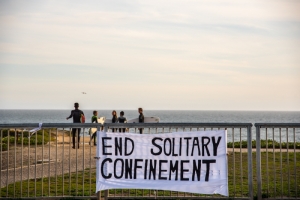
This photo was taken of Sitawa Nantambu Jamaa during a visit with him by his sister Marie Levin and Nube Brown. Thankfully, they were able to visit shortly before Sitawa’s recent stroke, and the visit included extensive planning for the Free Sitawa! Campaign.
This article was first published Jan 6, 2020 in the SF Bay View newspaper.
Promote the Prisoner Human Rights Movement
by Keith ‘Malik’ Washington and Nube Brown of the Liberate the Caged Voices Coalition
Peace and blessings, sisters and brothers!
There is a saying among the Muslim brothers: “Want for your brother what you want for yourself.” In the case of Sitawa Nantambu Jamaa, principled thinker, leader, brother, son and community member, we want freedom for him.
Last year in July 2019, Malik was granted parole by the Texas Department of Criminal Justice. In July 2020 we want to see the Parole Board in the state of California grant our Brother Sitawa his freedom when he goes before the board after five previous denials and 39 years of captivity, 32 of those years spent in solitary confinement.
It is not just a plea based solely on Elder Sitawa’s physical health. He is of a particular class of politicized prisoners subjected to decades of the torture of solitary confinement seen only in California, with rare exceptions in other states such as the decades of solitary endured by the Angola 3 in Louisiana.
And yet, Sitawa remains a stellar example of what positive transformations a human being can undergo in the most inhumane environments. Sitawa inspires us!
Many people fail to recognize that Sitawa, along with three other strong and principled leaders of the Pelican Bay Short Corridor Collective, inspired 30,000 courageous prisoners, who, in their struggle for freedom from the torture of solitary confinement – or the threat of it – chose to shun violence and rather embrace a peaceful strategy in order to bring about much needed change in CDCr (California Department of Corrections and rehabilitation) by implementing the powerful tenets of the Agreement to End Hostilities, an agreement that holds today, despite non-cooperation by CDCr.
Rather than being systematically punished for his leadership and commitment to the community on both sides of the wall, Sitawa should be rewarded with freedom and the opportunity to thrive and empower the community from which he was taken and show the world he is undaunted in his quest for change and peace.
We cannot and will not remain silent while CDCr uses a “death by incarceration” tactic on Sitawa and numerous other elders and leaders trapped in state prisons all across the United States.
Our respected Elder Mujahid Farid of Release Aging People in Prison taught me the slogan: “If the risk is low, let them go!”
Sisters and brothers, we suggest strongly that this should be our battle cry in 2020 for all incarcerated elders. Sitawa is a human being who deserves and has earned not just a national show of support, but an international freedom campaign, and we plan on helping to lead the way! Will you help us?
We leave you all with a quote from Victor Frankl that we would like all of you to meditate on – with the hope that it resonates in your heart, mind and soul. Perhaps it will motivate you to join this Freedom Campaign today:
“We must never forget that we may also find meaning in life even when confronted with a hopeless situation, when facing a fate that cannot be changed … for what then matters is to bear witness to the uniquely human potential at its best, which is to transform personal tragedy into a triumph.” – Victor Frankl, “Man’s Search for Meaning,” Washington Square Press, New York 1969
I, Malik, have faced the reality that being an outspoken New Afrikan man in Amerika means I must accept being despised and hated. How I respond to the hate is totally up to me! Today I choose a path of peace and love.
Activist Nube Brown says that love is the most powerful force in the universe. Let’s see if we can collectively tap into the power of love and encourage the state of California to FREE SITAWA in July 2020.
Meanwhile, as we organize the campaign and Brother Sitawa recovers from a stroke, please send him some love and funds, to Freedom Outreach, c/o Marie Levin for Sitawa, Fruitvale Station, P.O. Box 7359, Oakland CA 94601.
Click HERE to donate online for Sitawa, and for his family to be able to visit him.
Dare to Struggle, Dare to Win! All Power to the People!
Keith “Malik” Washington is assistant editor of the Bay View, studying and preparing to serve as editor after his release in 2021. He is also co-founder and chief spokesperson for the End Prison Slavery in Texas Movement, a proud member of the Incarcerated Workers Organizing Committee and an activist in the Fight Toxic Prisons campaign. Visit his website at ComradeMalik.com. Send our brother some love and light: Keith “Malik” Washington, 34481-037, USP Pollock, P.O. Box 2099, Pollock LA 71467.
Nube Brown is a New Abolitionist and activist working with California Prison Focus and facilitator of Liberate the Caged Voices. She is actively co-leading the Free Sitawa! Campaign to promote the Prisoner Human Rights Movement and hosts Prison Focus Radio on KPOO 89.5 San Francisco and KPOO.com every Thursday 11am to noon, PST. Nube is a proud member of the human race and seeks to dismantle the prison industrial slave complex and replace it with a transformative, healing justice paradigm. Connect with her at nube@prisons.org.













 Marie Levin
Marie Levin